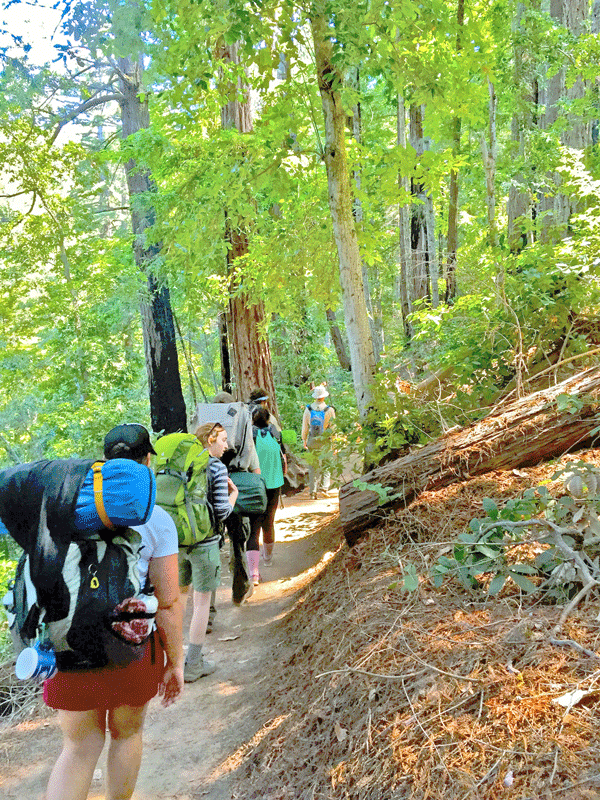
There’s a new way to take a vacation right in Santa Cruz Mountains. California State Parks now offers guided tours through its Santa Cruz County picturesque trails.
Along the way, the California State Parks Guided Backpacking Adventures provides a chance to see three waterfalls, as well as many of local ecosystems. This is the first year for the program locally, with the debut trips taking place in August.
Guides with extensive knowledge of local flora, fauna, and history, lead the one-night or three-night tours. Since the guides work at the parks where they lead tours, they get to know the land like it’s their home. By going on the guided tour, participants get a more complete immersion than if they backpacked by themselves.
“The guides are trained interpretive naturalists,” said Elizabeth Hammack, manager of the interpretation and education program within Santa Cruz District State Parks.
“They will be telling a lot of stories about Native Americans, and the pioneers that discovered Big Basin. They are also avid backpackers,” she said.
August 1 through 2 kicks off the first one-night trip. The route is Big Basin Redwoods State Park to Waddell Beach. The trip is estimated to be 13 miles long, with a net elevation change of 1,000 feet.
The second trip is August 21 through 24, and the route is Castle Rock State Park to Waddell Beach. Since that the distance is 30 miles long, this tour is the most challenging of the two trips. Backpackers are expected to hike 10 miles per day, with an elevation change of 3,000 feet.
The expected ratio is one guide to three backpackers. There are nine total spaces available for each trip. Families are welcome, but children must be at least age 13 and have strength to carry their own backpack.
“The trips are reasonably priced,” said Hammack.
The one-night trip is $90 and the three-night adventure is $190.
Hammack got the idea for introducing guided trips to the area after going on one herself in the Yosemite region.
“Having a naturalist telling the stories, and bringing it to life, made it so much richer,” she said. “I realized, why don’t we do that here? “
Though backpacking is a workout, the payoff lasts a lifetime. Even Press-Banner got a taste of what the trip will be like when the guides were doing their practice journey.
On the trial hike were park employees, who previously did not know each other. When Press-Banner caught up with them at Big Basin after the first night, everyone agreed that they bonded through the event.
While interviewed, the group was brewing hot tea for breakfast. Hot water is one of the things that the guides plan to provide to backpackers during the trips.
The recipe, however, did not include Earl Grey or green tea. The tea was made using Madrone berries and Manzanita paper, the fiber that’s found under the bark. And the consensus is that this tea had a pleasant taste.
According to tea maker Alex Trudelle, the guide based in Big Basin, many plants with medicinal qualities grow in the area.
“The Native Americans used this tea for prostate support,” he said.
Trudelle, who learned the information directly from local Native American tribal leaders, collected the ingredients for his tea at a private home before the trip. Other guides who plan to use native plants will do the same, as taking items from the state park is prohibited.
Along with Trudelle are guides Jeremy Lin, who is based at Rancho del Oso, and Erik Hylkema out of Castle Rock.
“We are the trifecta,” said Lin about their knowledge of the area.
Lin, who works as State Park Interpreter and Docent Coordinator, is also the leading guide during the trips. He said the goal is to bring a new level of awareness to trip participants.
“It’s not just getting from point A to point B. It’s really understanding the historical natural significance of the region,” he said. “We talk about natural history of redwood forest. We also talk about some modern issues.”
Since the trip meanders through the Waddell Creek watershed, the guides aim to impart information about keeping it pristine, and the importance of non-pollution.
As far as logistics go, backpackers are expected to bring their own meals. With the hot water provided by guides, dehydrated meals are the easiest way to stay nourished.
Those who want gourmet food are welcome to bring it. Since some of the stopping points had new animal proof lockers installed, night critters have gotten more manageable. The weight, however, is still an issue that has to be considered.
“We recommend that each person’s backpack does not exceed a third of their weight,” said Lin.
Water pumps, purification tablets, cookware and stoves will be shared among the group.
Once participants sign up, there is an information packet that’s provided. It lists everything they need to bring. There are also mandatory preparation meetings that take place before each trip.
Backpackers are responsible for their own transportation, and Lin emphasized that the public bus system is near the exit point.
Another piece of useful advice from the trial backpacking group is to break in hiking shoes before the actual trip. New shoes are notorious for creating blisters over long distances.
Alcohol and drugs must stay at home.
For more information, or to sign up, http://www.thatsmypark.org/parks-beaches/guided-backpacking-tours/ or call Cathryn at 831-429-1840.












